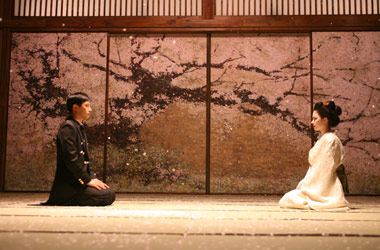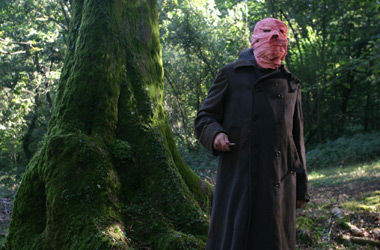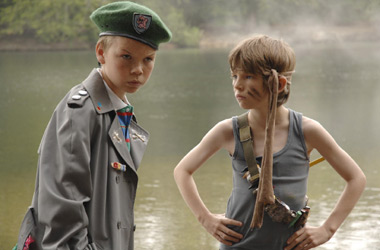The first film I saw at this year’s Philadelphia Film Festival was Pistoleros. Chilean born Dutch filmmaker Shaky González makes a modern-day spaghetti western, complete with a heist-gone-wrong, hidden loot, a trail of clues, betrayals, gunfights and mexican standoffs galore, with a little martial arts thrown in for good measure. An interesting and entertaining mix, though a little uneven in its execution.
The story follows Frank Lowies, the toughest, meanest gangster in Copenhagen. He catches wind of a plan to transport a large sum of money by train, and recruits two other gangsters to help pull it off: a Pakistani named Shameer and an Argentinian named Ramirez. Naturally, things don’t go as planned, and the three end up in jail. As urban legend has it, Frank hid a large portion of the money before getting nabbed by the police and hid it. The only clues to the whereabouts of the loot are a series of tatoos spread out amongst Frank’s friends. A few years later the folks involved in the heist get out of jail and start looking for the hidden loot.
Pretty standard stuff, really, but the manner in which it’s told is… interesting. The film employs a very unusual structure, and to be honest, I’m not sure it entirely works. On the other hand, without this structure, it probably wouldn’t work as well. The story is told mostly in flashbacks. A documentary filmmaker named Martin and his producer Camilla meet up with a washed-up gangster named Crazy Uffe, who is supposedly very knowledgeable on Frank Lowies and the story of the hidden money. The story doesn’t come out directly, though. Instead, we get a flashback withinin a flashback. Crazy Uffe tells the story of how he told Frank Lowies’ story to another gangster named Yugo Ivan. Uffe owed Ivan money, so he told the story in the hopes of paying off his debts with Lowies’ hidden stash. In the middle of telling his story, he gets interrupted by someone else at the bar, who tells the story of how the heist was conceived and how it went wrong, at which point we return to Uffe’s story. Finally, someone else joins in and says they’re all wrong, and that the money is still out there.
So we’ve got all kinds of flashbacks within flashbacks and unreliable narration, and it’s tempting to attribute a Rashômon-like signifigance to it all, but I think that’s probably giving this film too much credit. As you can probably tell from the descriptions above, it’s a bit confusing and the structure is awkward to say the least. There is definitely some ambiguity left at the end, especially considering the sequence shown during the credits of the film (don’t stop watching once the credits start rolling!), but really, the whole story and structure is just an excuse to partake in some action-packed fun.

The atmosphere is wonderful, though I think the film could have done more with it’s intriguing mixture of spaghetti western tropes and modern-day imagery. The music deserves some mention, as it’s evocative of Ennio Morricone’s brilliant scores from Sergio Leone’s classic films. There are a couple of great scenes where we see our heroes driving their motorcycles (in place of horses) throughout Copenhagen (in place of the old West) with the spaghetti western score blaring in the background. It struck me that this sort of thing hasn’t been done much (if ever), and that I’d love to see more modern-day spaghetti westerns. There are references galore. Obviously, the spaghetti westerns like The Good, The Bad, and The Ugly (the plot of Pistoleros is most reminiscent of this film, and someone even refers to a character as “blondie”) and Once Upon a Time in the West get many homages, but there’s more than just that. Robert Rodriguez is definitely an influence on this film, and you can see lots of other references to gangster films. Oddly, there’s also a bit of martial arts thrown in for good measure, but that works better than I thought it would. The action sequences are energetic and well staged, and while the editing and pace of the film is quick, you don’t lose track of what’s going on.

Ultimately, it’s a decent film that could have used a tighter story or perhaps a structure that wasn’t so haphazard. I’m guessing that we’re going to see more from writer/director Shaky González, and while this film isn’t perfect, it’s definitely an interesting effort and I’d love to see what he comes up with next… **1/2 (out of 4 stars)




